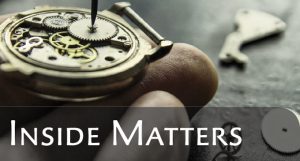 Learn everything you need
Learn everything you need
to know, not the bare minimum
“[S]oft skills” are often the hardest to learn, and the most important
to possess, when working in an independent insurance agency.
By Cheryl Koch, CPCU, ARM, AAI, ACSR, AFIS, and Mary Belka, CPCU, ARM, ARe, RPLU, CIC
It was bound to happen sometime. Last week, we were presenting our two-day Ultimate Account Manager program in Ohio. At lunchtime on the first day, one attendee let us know that she had to leave and return to her office.
Apparently, she had called her boss and told him that the program did not offer state continuing education (CE) credit, so he told her there was no reason for her to take the class and she should get back to the office immediately.
Now, if she’d stayed, here are some of the things she might have learned:
How to manage her workload without being constantly behind and suffering from burnout
How to have fierce, but productive, conversations with colleagues, clients and carriers
Using active listening to overcome objections, deal with difficult people and sell intangible products
Creating and deploying a professional development plan to guide her through her insurance career
Understanding the current state of agency errors and omissions claims and what to do (or stop doing) to minimize those risks
Utilizing a risk management process when dealing with clients to help them achieve better financial outcomes
Understanding the unique characteristics of insurance contracts and how to explain them to clients in terms they will understand
But alas, like many other states, Ohio does not allow continuing education credit for “soft skills” training. Unless you are attending a coverage class or one that deals with ethics or insurance fraud, you can pretty much kiss your CE goodbye.
Ironically, “soft skills” are often the hardest to learn, and the most important to possess, when working in an independent insurance agency.
With that as a backdrop, we thought we’d take this opportunity to review what we feel are the top ten characteristics required to be a top-notch insurance professional.
- Empathy. This is the ability to see other peoples’ points of view and understand how and why they are feeling the way they are. Especially in this hard market, you can’t have too much empathy as people are forced to make very difficult decisions when faced with rising premiums and restricted capacity.
Whether you’re in sales or service, emotional intelligence is now eclipsing IQ (intelligence quotient) as a critical skill.
- Sense of urgency. We work in one of a small number of industries where there is an actual “buying date.” Imagine if you sold automobiles or washing machines—you’d never know when someone was in the market for a new one. But we have an expiration date, which allows us to manage the many steps required to renew an account.
Both producers and account managers must call on this urgency trait daily to avoid that last-minute rush that turns what should be an ordinary workflow into a crisis.
- Critical thinking. The ability to work with complex systems, processes and documents is essential to excelling in insurance sales or service. What we sell are complex legal contracts and the ability to navigate and understand them. It is critically important to be able to translate these concepts properly, to the language of an applicant or policyholder.
Along with critical thinking, the ability to use sound judgment and make good decisions is also of paramount importance. What we really do is help people make better, more informed risk management decisions by employing our own ability to gather information and convey it to clients.
Critical thinking is essential to producing better outcomes for our clients, and to provide them with unmatched service.
- Confidence and self-esteem. Nobody wants to entrust their most valuable assets to a person who exudes uncertainty or lack of conviction. It’s not necessary to be an egomaniac to do well in the insurance industry, but to paraphrase Zig Ziglar, author of Timid Salesmen Have Skinny Kids, knowledge is one of the best ways to build confidence and that knowledge also helps agents be more creative and focused on solving problems and finding solutions.
- Unselfishness. It’s never about us or our agency; it’s about the client. That’s not to say that clients are always right, because we know that’s not the case, but they are always the reason we exist. The ability to make someone feel like they’re the only person you have to talk to today is a very special skill.
If you’ve ever attended a lecture or seminar and it seemed like the speaker was talking only to you, you can relate to the feeling a client gets when dealing with a member of the agency’s staff. Of course, in order to do that, you have to be able to prioritize your work and be in command of your desk.
- Managing multiple and shifting priorities. In some respects, organizing your day in insurance is like trying to nail Jell-O to a wall. Whoever thinks a career in an insurance agency is boring has clearly never spent a day as a producer or account manager. If only!
What many of us simultaneously love and dislike about this industry is that no two days are exactly alike. Being able to quickly determine if an incoming item is critical, meaning it must be done immediately, or if it is workflow (and must be done within an acceptable period of time) is something that can be learned and honed.
Having the discipline to “plan your work and work your plan” is what separates many outstanding account managers and producers from their mediocre counterparts.
- Ability to see the big picture. In order to be a true business partner to the agency’s clients, both producers and account managers must have a global view of the insurance industry. Being able to see what’s on the horizon and observe developing trends helps us keep our clients informed and minimizes the surprises that the changing marketplace might dictate.
Whether that’s navigating your way through a global pandemic, surviving and thriving in times of economic uncertainty, or responding to the new challenges facing our industry such as social inflation and “nuclear verdicts,” increasing cyber attacks, or climate change, the best-informed people tend to have the best-informed clients.
- Resilience and persistence. No matter how much you love your profession, there will always be days when the stress gets to even the most resilient person. The ability to not take things personally, to push through when it seems so much easier to relent, and to follow through on one’s commitments are hallmarks of a true professional.
The ability to exhibit calm when the storm is moving in and focus on what needs to be done are not natural reactions for some people, but they are things that can be practiced and mastered. You don’t always have to be the most gifted person in your position, because energy and endurance can make up for deficiencies in other areas.
- Attention to detail. Whether we like it or not, and some of us really do not like it, ours is a business of precision and detail. “Close enough” may exist in the world of horseshoes and hand grenades, but that would be the death knell for any serious insurance professional.
The little things, like getting an address correct or noticing a comma in the wrong place, or improperly stating the type of legal entity of an insured can mean the difference between coverage and no coverage.
The devil really is in the details and while it may not be someone’s innate ability to pay attention to such things, it is certainly something that can be taught and learned.

The authors
Cheryl Koch is the owner of Agency Management Resource Group, a California firm providing training, education and consulting to producers, account managers and owners of independent agencies. She has a BA in Economics from UCLA and an MBA from Sacramento State University. She has also earned several insurance professional designations: CPCU, CIC, ARM, AAI, AAI-M, API, AIS, AAM, AIM, ARP, AINS, ACSR, AFIS, and MLIS.
Mary M. Belka is owner and CEO of Eisenhart Consulting Group, Inc., providing management and operations consulting to the insurance industry. She also is an endorsed agency E&O auditor for Swiss Re/Westport. A graduate of the University of Nebraska, Mary holds the CPCU, ARM, ARe, RPLU, CIC, and CPIW designations.
- True love of people. When you put together the aforementioned skills and abilities, and combine them with the right attitude, you have an unstoppable insurance professional—someone who will always go the extra mile and take ownership of any problem.
People who are accountable and responsible don’t waste time making excuses. They spring into action and get the job done.
If you need help learning to be more empathetic or honing your active listening skills, don’t go crawling to your state department of insurance seeking CE credit—your pleas will likely fall on deaf ears. Interestingly, not one of the people who attended the full two-day program made any mention of the lack of continuing education credit, nor did we hear from any of their bosses.
Pity the people who see education as being only minimally in compliance with required CEs versus learning everything you can to better serve your clients.




